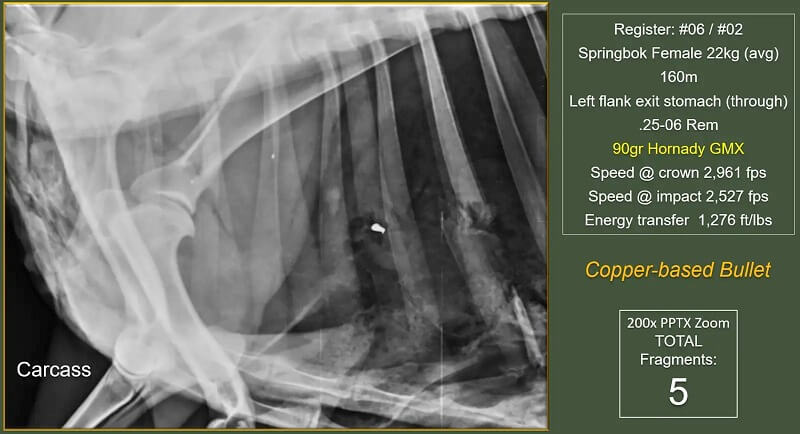+264 (0)61 240 140admin@n-c-e.org
Namibian Wildlife Lead (Pb) Poisoning Working Group
Namibia's Carnivores
Summarised from: https://conservationnamibia.com/blog/b2021-unleaded-please.php
Lead is a toxic substance with well-known negative impacts on human health which are particularly severe for children and pregnant women. Children absorb lead into their bloodstream more readily than adults, while lead consumption in pregnant women may cause developmental problems in unborn babies. Health researchers have not been able to determine a safe level of lead in the human body, and lead accumulates in the body over time. Consuming even tiny amounts of lead regularly is therefore likely to cause long-term health problems. That knowledge resulted in leaded petrol being phased out, along with a host of other legislation restricting the use of lead.

© CHASA and Natshoot
Lead bullets are a particular threat to human health in Namibia, because many people eat game meat from hunts with lead bullets. When a lead bullet hits its target, it fragments into tiny pieces which are not visible to the naked eye and are readily absorbed in the blood stream if consumed.
Lead is also an environmental hazard, and there are no safe levels of lead for any biological organism to consume. Most bullets and fishing sinkers still contain lead, both of which are used for outdoors activities and therefore inevitably land up in the environment. Scientific evidence shows that lead poisoning through bullet consumption by scavenging bird species in Europe and North America is threatening their health and reproduction and recent studies from South Africa and Botswana have shown that white-backed vultures (adults, juveniles and chicks) had blood lead levels higher than expected from background exposure. Chronic lead exposure destroys the neurological system and vultures with high levels of lead in their bodies can be lethargic, anorexic and weak, among other things. Even if the bird does not die due to lead itself, these symptoms reduce its reproductive success and could make it more vulnerable to other causes of death.
The solution: The problem of lead poisoning in humans and vultures due to ingesting bullet fragments from game meat and carcasses is solvable. The solution is to switch to non-lead ammunition.

© CHASA and Natshoot
It is time for hunters and fishers, who enjoy activities that are supported by a healthy environment (and often eat what they kill), to remove lead entirely from the hunting and fishing equation. Studies from North America and Europe, where non-lead ammunition has been manufactured for several decades, show that non-lead bullets perform as well or better than lead bullets. A South African manufacturer has started producing non-lead ammunition and some southern African conservation organisations have already switched to lead-free ammunition for their culling operations. Going lead free will improve the safety of game meat for human consumption within Namibia and help to open up export markets.
Thus, the ultimate aim of the NWLPWG is to facilitate the transition from lead to non-lead bullets as quickly as possible, which will be better for our health and our environment.

